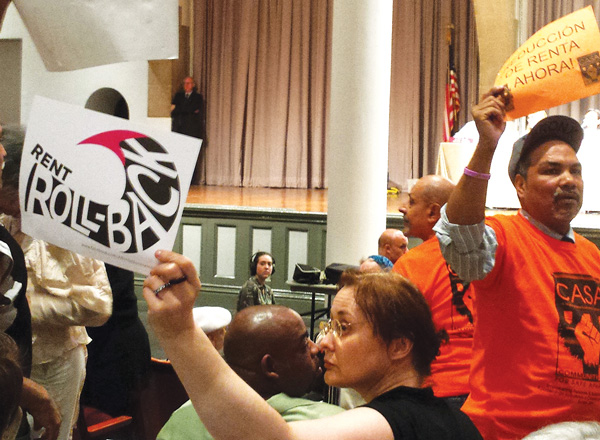Last Thurs., Oct. 1, the new rent adjustments for rent regulation in New York City went into effect. In the historic vote, held at the end of June at The Cooper Union’s Great Hall in the East Village, the Rent Guidelines Board called for no increase for one-year lease renewals and a 2 percent increase for two-year renewals.
The new adjustments apply to all rent-stabilized leases up for renewal between this Oct. 1 and next September.
What had never been achieved in the 46 years of existence of the R.G.B. was finally pulled off — a rent freeze!
Many in the raucous crowd, featuring passionate housing groups from the Bronx and elsewhere, shouted in English and Spanish, “What do we want? Roll-back!” That would have meant an actual rent reduction for New Yorkers living in the city’s 1 million rent-stabilized units, which is slightly less than half of the city’s total stock of 2.2 million rental apartments. At the news that there would only be a freeze, many started angrily crying out, “Shut It Down!”
However, as Harvey Epstein, a former chairperson of Community Board 3 who is an R.G.B. appointee, assured the crowd, calming the mood in the auditorium, putting things in perspective: “Let’s realize, this is not a sprint. It’s a marathon. This is about today, this is about the future. We’ll be back next year, to keep doing better and better.”
In other words, the guidelines board, as currently composed by Mayor Bill de Blasio, will have at least two more go-rounds in the mayor’s current term — and then in a possible second de Blasio term — to either keep instituting a rent freeze or even call for a rent rollback.
Clearly, the figures justify a rollback. In recent years, the R.G.B. has exaggerated landlords’ projected operating expenses, using these faulty numbers to justify rent hikes for hard-working New Yorkers trying to stay afloat in a tough economy amid never-ending inflation. The cost of living simply keeps going up and salaries are not keeping pace.
But the landlords’ price index that the R.G.B. uses to calculate rent increases this year was its lowest since 2002. Meanwhile, landlords have seen a net operating increase — profits — of 34 percent since 1990.
Yet, even if there is not a rollback next year, two more years of rent freezes would go a long way toward helping tenants get by. As it is, 35 percent to 40 percent of city residents are currently paying half their income toward rent, to the point that they are, by definition, “rent burdened.” Three-quarters of a million New Yorkers are living below the poverty line. One setback and these people are simply left reeling. It’s an untenable situation.
Mayor de Blasio has explained this situation very clearly, as seen in his State of the City speech earlier this year. Indeed, freezing rents was a huge step in addressing the city’s “affordability crisis,” as he has defined it.
De Blasio has taken his share of blows in his first two years, from the police crisis to the homeless crisis — the latter which is probably going to wane now that it’s cooler.
But the rent freeze was a dramatic display of de Blasio’s power to shape the city. What always seemed impossible is now a reality. He couldn’t quite manage it in his first year, since he hadn’t yet gotten full control of all the R.G.B. appointments. But firmly in the driver’s seat in year two, he made good on his pledge to hold the line on rents.
During the run-up to the R.G.B.’s vote, we were particularly inspired by our local freshman Councilmember Corey Johnson, who showed real leadership — and faith in de Blasio’s wherewithal — in championing early on the push for a rent freeze and preferably a rollback.
It was good to see Johnson among the crowd at Cooper Union giving two thumbs up as the R.G.B. members cast their votes and shouting, “Si, se puede!” (“Yes, we can!”)
Jumaane Williams, a leader in the Council, was also there, lending his voice to the call for a “Roll-back!” Assemblymember Brian Kavanagh was in the house, too.
Landlords and real estate organizations obviously are apoplectic over the rent freeze.
“This is myopic,” complained a landlord representative on the board.
However, property owners will still be making their profits, but at long last, the unfair rent gouging is being stemmed.
As Rachel Godsil, the board’s chairperson, so aptly put it: “Tenants are struggling, while landlords are doing O.K. Our charge is not to widen the gap, but to make the system equitable.”
Bravo!
A big negative, sadly, was Governor Cuomo’s failure to significantly raise the cap for vacancy decontrol. He boosted the amount only around a couple hundred dollars. That is a problem because it means more affordable units will be lost. Still, it doesn’t diminish the historic rent freeze.


































